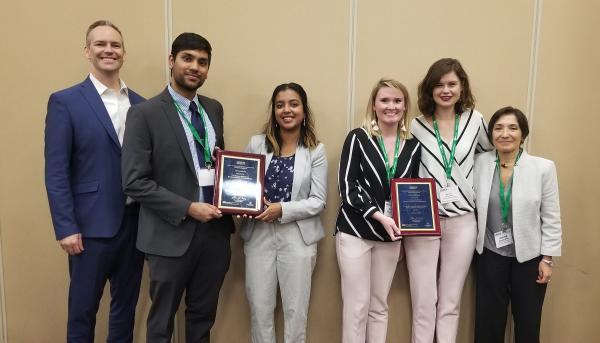Two teams of students from the Wallace H. Coulter Department of Biomedical Engineering at Georgia Tech and Emory won a chunk of prize money in the 2019 DEBUT (Design by Biomedical Undergraduate Teams) Challenge.
Taking second place and earning $15,000 was a team of four students – Danae Argyropoulou, Pranav Dorbala, Alison Wong, Madhumita Baskaran – who designed a device to rapidly screen for C. difficile infection (CDI), an antibiotic resistant, intestinal bacterial infection that can be life threatening.
And winning the HIV/AIDS Prize of $15,000 was a BME team called Creative Edge Medical (previously called ScalPal). The team of Rachel Mann, Bailey Klee, and Nick Quan, who developed packaging for scalpel blades that is both functional and protective, eliminating injuries and reducing exposure to bloodborne diseases.
Scalpel injury is fairly common, with an estimated 27,000 injuries occurring in the U.S. each year, putting healthcare workers at risk for the spread of bloodborne illnesses such as HIV/AIDS and hepatitis. About 70% of these injuries occur when the scalpel isn’t even being used. The current process to assemble a scalpel requires needle holders (tweezers, basically) to grasp the blade and slide it onto the handle, so the blade is exposed at all times.
“Our goal was to minimize injury incurred by the scalpel, and the best way to do that is to ensure the sharp end of the blade is never exposed during assembly,” said Mann. “Our device meets this goal, while simplifying the process and saving time in the operating room.”
So the team designed fully disposable packaging (they’re currently calling it ‘Sharp Protector’) that only requires insertion of the handle for the blade to attach. Reinsertion of a used scalpel knife will remove the blade, trapping it within the device for disposal; this allows the device to serve as a sharps protector (thus the current name of the product), minimizing the risk of injury down the waste management cycle.
“Feedback we have received from both physicians and judges has been overwhelmingly positive,” Mann said. “Nearly every surgeon, doctor, and nurse that we have taken our device to has a story of a time when they cut themselves using a scalpel. This reinforced the need for a device like the one we designed.”
The team competed in the 2018 InVenture Prize finals with its device, which has been refined since. They’ve been working on the Sharp Protector for two years, and have recently filed a non-provisional patent and an early application for a patent with the Patent Cooperation Treaty (PCT).
Meanwhile, the team of Argyropoulou, Dorbala, Wong, and Baskaran set out to address a multi-billion dollar problem. C. difficile (C. diff) is a serious healthcare acquired (HCA) infection that has a $6.3 billion impact in the U.S. alone.
“We were able to see the problem first-hand at numerous hospitals around the Atlanta area where our group members shadowed, and volunteered,” said Argyropoulou. Every healthcare provider we talked to reiterated the need for better testing methods, so we knew that the work we were doing was impactful and necessary.”
Current C. diff detection methods are time consuming, and are a drain to hospital resources. The main goals for our solution were to reduce the testing time and testing costs to make our solution better than the current options. The team devised an elegant, inexpensive, and unique solution – a paper-based screen that requires only a single step to work while yielding results in less than five minutes, reducing the screening time and costs by over 90%.
“We’re proud that we were able to use so many facets of our BME education to construct a final product,” noted. “Every healthcare provider we interviewed reiterated the need for better testing methods, so we knew the work we were doing was impactful and necessary.”
DEBUT is a biomedical engineering design challenge for teams of undergraduate students, managed by the National Institute of Biomedical Imaging and Bioengineering (NIBIB), part of the National Institutes of Health (NIH), and VentureWell, a non-profit that cultivates revolutionary ideas and promising inventions. The $80,000 in prizes were awarded last week during a ceremony at the annual Biomedical Engineering Society (BMES) conference in Philadelphia.
Media Contact
Jerry Grillo
Communications Officer II
Parker H. Petit Institute for
Bioengineering and Bioscience
Keywords
Latest BME News
Jo honored for his impact on science and mentorship
The department rises to the top in biomedical engineering programs for undergraduate education.
Commercialization program in Coulter BME announces project teams who will receive support to get their research to market.
Courses in the Wallace H. Coulter Department of Biomedical Engineering are being reformatted to incorporate AI and machine learning so students are prepared for a data-driven biotech sector.
Influenced by her mother's journey in engineering, Sriya Surapaneni hopes to inspire other young women in the field.
Coulter BME Professor Earns Tenure, Eyes Future of Innovation in Health and Medicine
The grant will fund the development of cutting-edge technology that could detect colorectal cancer through a simple breath test
The surgical support device landed Coulter BME its 4th consecutive win for the College of Engineering competition.








